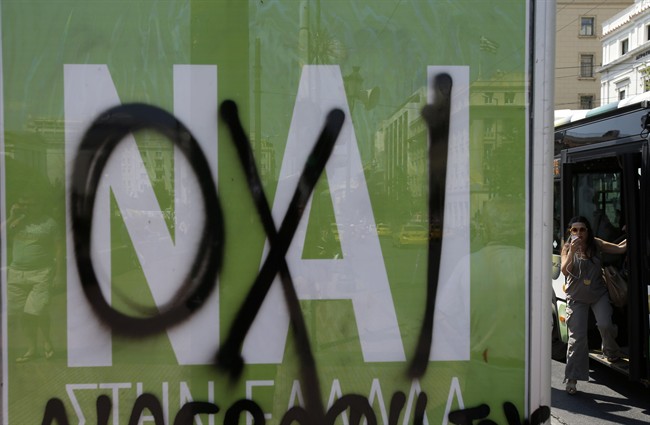Greece is at a turning point, its population faced with a choice to concede to economic reforms in order to get another financial bailout package or stand with its anti-austerity, leftist leader and risk saying goodbye to the country’s place in the eurozone.

Greeks are headed to the polls to decide on whether or not to agree to the terms of bailout that won’t necessarily save Greece from financial ruin but may, at the very least, bandage the ailing economy.
When is the referendum happening?
Eligible Greek voters will head to the polls on Sunday, July 5.
What are Greeks voting on?
Here’s the “Yes” or “No” question Greeks will be asked on their ballots.
Should the plan of agreement be accepted, which was submitted by the European commission, the European Central Bank, and the International Monetary Fund in the Eurogroup of 25.06.2015 and comprises of two parts, which constitute their unified proposal?
The first document is entitled “Reforms For The Completion Of The Current Program And Beyond” and the second “Preliminary Debt Sustainability Analysis.”
NOT ACCEPTED/NO
ACCEPTED/YES
Simple, right?
To put it in terms that most people will understand, voters are being asked whether or not they’ll accept the austerity measures the IMF, ECB and EU — often referred to as the “troika” — want put in place in order to offer them a new bailout.
Not only is the ballot confusing, the deadline for Greece to accept the terms of the bailout offer expired June 30 same day Greece failed to make its $1.6-billion debt payment to the International Monetary Fund. The troika is waiting for the results of the referendum before making its next move.
READ MORE: Greece becomes 1st developed nation to default on IMF payment
WATCH: ‘No’ demonstrators in Athens clashed with Greek police on Friday two days before Sunday’s bailout referendum.
Which way are they going to vote?
Prime Minister Alexis Tsipras has urged the Greek public to vote “no” but some polls and oddsmakers are expecting a “Yes” vote.
A nationwide poll of 1,053 Greek citizens, released by polling company Public Issue, showed the “Yes” vote with a slight lead — 45.5 per cent of respondents said they will vote “Yes” compared to 45 per cent who said they’ll cast a “No” vote.
According to The Guardian, a separate poll conducted by Proto Thema had 41.7 per cent of Greeks planning to check the “Yes” box, with 41.1 per cent who intend to mark “No.”
READ MORE: How the Greek financial crisis could affect Canadians
- Posters promoting ‘Steal From Loblaws Day’ are circulating. How did we get here?
- Canadian food banks are on the brink: ‘This is not a sustainable situation’
- Is home ownership only for the rich now? 80% say yes in new poll
- Investing tax refunds is low priority for Canadians amid high cost of living: poll
Meantime, Ireland-based betting website PaddyPower is putting favourable (4/9) odds on Greeks accepting the terms of the bailout, while odds are 13/8 that Greeks will reject the bailout terms.
Why do I keep seeing the word ‘Grexit’?
It’s a play on Greece exiting the eurozone.
If there’s a no vote it could very well pave the way for Greece saying goodbye to the Euro and having to adopt a new currency — a reborn drachma — that would be worth little compared to the Euro.
The IMF, European Central Bank and European Commission have warned that this could be a result of not agreeing to the terms of a bailout.

It could also mean an exit for Tsipras.
“If the Greek people want to proceed with austerity plans in perpetuity, which will leave us unable to lift our head… we will respect it, but we will not be the ones to carry it out,” BBC reported Tsipras saying.
He believes a “no” vote will put Greece in a better bargaining position and expects there to be a new bailout deal offered within 48 hours of the vote.
Finance Minister Yanis Varoufakis has already threatened to hand in his resignation if the Greek public goes against the leftist government and votes “Yes.”
Would a bailout end Greece’s financial woes?
No. Even with a bailout, Greece’s economy will be on shaky ground for possibly the next 15 years.
Details contained in IMF documents leaked this week predict Greek debt would remain at 118 per cent of its gross domestic product in 2030 if it agreed to the terms needed to get a new bailout, The Guardian reported. The IMF regards that as unsustainable, setting 110 per cent of a country’s GDP as the maximum debt threshold.
READ MORE: Crowdfunding campaign created by British man to pay off Greek debt
But, that’s better than what it is now. According to The Guardian, Greece’s debt currently accounts for 175 per cent of its GDP.
The IMF has warned Greece needs $60 billion in debt relief to keep the economy going until the end of 2018.


Comments